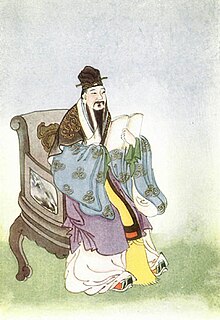
Back Mengzi Afrikaans منسيوس Arabic منسيوس ARZ Menciu AST Men-Tszı Azerbaijani Мэн-цзы Bashkir মেনসিয়াস Bengali/Bangla མེང་ཙེ། Tibetan Meng Zi Breton Menci Catalan
| Part of a series on |
| Confucianism |
|---|
 |
Mèng Kē (Chinese: 孟軻), who is usually known as Meng Zi (Chinese: 孟子),which means "Master Meng," or Mencius (which is the Latin form of Meng Zi), was not in the generation of students who worked directly with Confucius, but in the second generation after it. He lived from about 371 B.C. to about 289 B.C.[1] Mencius regarded Confucius as the greatest teacher,[2] and he wrote a book in which he tried to explain the full picture behind what Confucius taught. The book is just called by his name, so in English it is called the Mencius.
In his book, Mencius taught that humans are born with four gifts: The first is the natural ability to feel what other people feel and to want to help and protect them. The second is to recognize when you are not doing your share of the job of maintaining a good society. The third is to recognize conflict situations before they grow big and to defuse them. The fourth is to recognize when some other people are hurting other people and want to obtain justice for those being hurt.
Mencius believed that just as the people owed things to the ruler, the ruler also owed things to the people. So if a man held the position of ruler but did not do the things for the people that a ruler should do, then it was acceptable for the people to get rid of the ruler, and even to kill him.[3]
